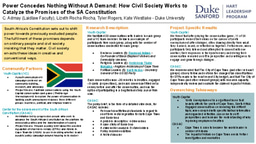International Blog 2025: Six Weeks in Cape Town
The ride to the University of the Western Cape’s Center for Humanities Research, where my team was acting as visiting researchers, was the most beautiful commute I will likely ever have. As the morning light enveloped whoever’s Uber we were in for the day, I would look to the right and see an endless expanse of ocean glittering beside the city. To the left was Table Mountain, one of the world's oldest. The flat-topped mountain is situated in the center of the city, and in a way, its unmoving presence was a grounding force for all the newness I was experiencing throughout my time there.
Alongside all of the beauty Cape Town offered me on the ride was a display of its many complexities. As we drove by neighborhoods, fences and gates were all that met the eye–the walls often higher than the buildings themselves. The cottage my team and I stayed in was surrounded by a fence of thick walls covered in vines and greenery meant to obscure its real purpose. While walls, gates, and electric fences cover physical structures around the city, invisible walls remain as vestiges of apartheid. White and orange taxi vans crowd the streets at all times of day, transporting people who work in the city to their distant accommodations on the periphery. The underlying tone of this is that people who spend their whole lives working in the center of Cape Town, people who depend on it for their livelihood, don’t deserve to call it home. That they are not worthy of being part of the place they give so much to. The feeling of disparity and deliberate separation is tangible and impossible to ignore.
Despite all of that, or maybe because of it, Cape Town also holds a kind of determined generosity. One of my biggest takeaways from the summer is the philosophy of ubuntu: I am because we are. Rev. Desmond Tutu’s belief that “my humanity is bound up in yours, for we can only be human together” followed me throughout my time in Cape Town. It was a constant reminder that leadership is not about individual success, but rather about mutual care and collective growth. Even now, I recognize the profound impact the principle will have on my leadership journey. A principle of which I hope to be a lifelong practitioner.
Though I am just beginning to understand how my time in Cape Town has shaped me, I am struck with an overwhelming sense of gratitude. Gratitude for the opportunity to grow in an entirely new place. For the challenges that pushed me during those six weeks. For the pod of hundreds of dolphins I saw off the coast of Simon’s Town. For scones. And for all the people who shared a part of themselves with me, big or small, and gave me a chance to share part of myself as well.
For that, and more, I am incredibly grateful.

Please sign in
If you are a registered user on Laidlaw Scholars Network, please sign in